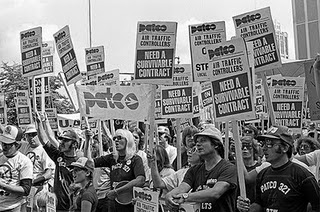In chapter 2, amusingly titled "Thinking Like an Economist", Mankiw sets out to describe the economist's world view. The chapter is similar in scope to some of the most popular economics textbooks of the last 50 years, demonstrating a long tradition of taking time in an intro text to introduce the student to the language and tools of economics
before jumping into supply and demand.
But, for whatever reason, Mankiw's treatment of the topic is remarkably different than his predecessors, and in some very important ways. What I want to concentrate on today, briefly, is the role of analogical reasoning in chapter 2 of Mankiw's text.
Now, readers of this blog who have taught before know that analogies can be extremely powerful tools for comprehension. Have a difficult topic you need to cover, and not everyone seems to get it? Try an analogy by drawing a connection between the theory and some experience they have in their daily lives -- like back at their dorm room or at home or something.
But, as some of you may also have realized when trying to deliver these analogies, there are also a lot of problems with them. There are minor issues. It's easy to have your analogy miss some part of the audience, for example. Talk about Buffy the Vampire Slayer when maybe 5% of the room has ever even seen an episode makes your point less effective. Basically, if people aren't familiar with what you're drawing an analogy to, your argument immediately loses credibility.
But there are more serious problems with analogical reasoning. On the most basic level, analogies cannot be used as air-tight proofs of some conjecture because they derive their credibility from the likeness of two separate concepts and the images people have in their minds of those two concepts. Analogies are really best used as helpful mnemonics or for some humorous or otherwise playful purpose. Thus, while they might be good last-resort methods, they are poor substitutes for a sound argument. This point is essentially derived from the fact that the actual effectiveness of an analogy is only as good as the similarity is between the two objects being analogized. Drawing poor analogies will only confuse the student -- because they will start thinking "well, is economic concept A really like analogous concept B? There are some important differences between A and B such as..." -- as soon as they start down that road, you've lost them on your original argument for economic concept A.
Unfortunately, Mankiw commits these mistakes all over the place in chapter 2 of his favorite textbook. The result?
Analogical reasoning may help to improve on a basic understanding of economic methodology, but you can never actually prove anything using analogy -- nor can you give a deep analysis of a concept by relying on analogy. At best, Mankiw's analogical reasoning approach to economic methodology perpetuates an incomplete understanding of the role of methodology in economics. At worst, the (poor, insufficient) analogies lead to pure intellectual brainwashing by failing to provide a rigorous account of the core (crucial, politically contingent) ideas.
Example from the text: Mankiw on the use of assumptions in economics
The premise: assumptions are important in economics because they force us to boil down a situation into its essential aspects. We can then use logic and reasoning -- i.e. the deductive method -- to derive economic predictions based on our assumptions.
Analogy: it is similar to the situation of a physicist who wants to know how long it will take for a marble to fall from a building. The physicist abstracts from other forces, such as wind, which might impede the fall of the marble. In other words, the wind force is said to be "negligent". In this manner, the physicist can obtain a good approximation of how long it will take the marble to reach the ground. And obviously, we might adjust this assumption of no wind in the case of a beachball, in order to obtain a better prediction.
How competing textbooks dealt with the same idea: Samuelson (1985) deals with methodology but not assumptions per se. Nevertheless, a large majority of his discussion of methodology relies on logical discussion, illustration of the core ideas (but not until the argument has been explained in words). McConnell (1978) discusses simple critiques of the above premise -- for example, that assumptions tend to be unrealistic, thereby leading fall predictions of behavior. He also spends some pages discussing the shortcomings of the deductivist approach in general (i.e. the proliferation of mathematics, of unrealistic but complex models), in light of the debate over assumptions. Lipsey and Steiner (1975) go a little further. They give a lengthy discussion about how the realism of assumptions does not matter as long as the theory has predictive power. L-S, it should be noted, are much more mathematical and methodlogically conscious than the other texts.
Why does it all matter: students could become caught up in the many ways in which physics is
not like economics -- in the relative lack of experimental data, or the fact that molecules can't think, or in the lack of any "universal laws" or constants which define the core theory of the field. This immediately weakens the analogy -- which, as was stated above, should only be used in informal situations to begin with. In the end, it is an ineffective tool and only perpetuates the idea -- already hinted at in chapter 1 -- that this textbook seriously lacks intellectual integrity.








